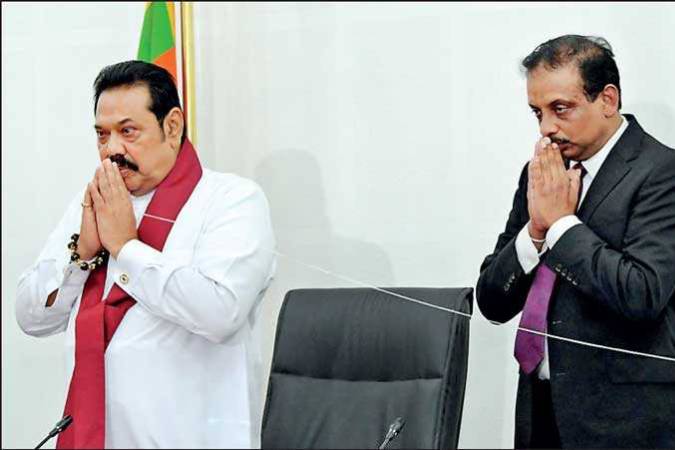Prime Minister Mahinda Rajapaksa yesterday assured policy consistency, competent leadership and economic stimulus to turnaround Sri Lanka’s economy in the shortest possible time, when assuming duties as the Finance Minister.
Speaking at the Finance Ministry, Prime Minister Rajapaksa spoke extensively on what he termed the shortcomings of the previous administration. He insisted that due to their numerous shortcomings, the economy had been suffering for a number of years and it was now his responsibility as Finance Minister, for the fourth time, to implement solutions.
He also made an effort to bolster the confidence of the public sector, censuring the Financial Crimes Investigations Division (FCID) for its conduct and assuring that he would bring in legislation which would protect all public employees who made decisions based on “good intentions” from any legal persecution.
“The FCID has frightened public servants to the point they are afraid to take decisions. In the near future I hope to introduce legislation that will protect any public servant working with good intent. Fear of persecution has resulted in the public sector grounding to a virtual halt,” he told the Finance Ministry staff, well-wishers and reporters.
Rajapaksa pointed out that the policy manifesto of President Gotabaya Rajapaksa aimed to achieve a slew of goals for Sri Lanka, including increasing economic growth to 6.5%, per capita income to $ 6,500, delivering sweeping tax cuts while maintaining the Budget deficit under 5% and bringing interest rates to single digits.
“Policies to rejuvenate the economy have already been drawn up and implementing them will happen fast. Not only will we provide relief, we will also provide a boost to the economy and achieve the targets that have been set out in our manifesto. We are confident that we can achieve this but it can only be done with the dedication and hard work of everyone. We will create an economy that will provide tangible prosperity for everyone, including fishermen, farmers, small enterprises and large companies.”
Rajapaksa severely criticised the previous administration headed by former Prime Minister Ranil Wickremesinghe, whom he insisted had taken on a country that was experiencing good growth.
“This is the fourth time I have become the Finance Minister and at each instance there have been different challenges for us to deal with. This time I have become Finance Minister at a critical point for Sri Lanka. To understand the weight of this challenge it is necessary to look back at where we were in 2014. At that point, for five years the average growth rate was 6.8%, our GDP growth had grown to $ 79 billion, inflation was at 3.3% and reserves were at a historical high of $ 8.2 billion,” he said.
Rajapaksa added that the exchange rate was at about Rs. 130, lamenting the depreciation of the rupee that had taken place since then, and argued that the country’s debt had increased as a result. He also contended that poverty had been under control, as much as 98% of the population had uninterrupted electricity, the Budget deficit was low and taxes were at a level which people could bear. Debt as a percentage of GDP had reduced to 71% from 91%.
“In addition, Sri Lanka had the capacity and background to face a global crisis with courage and professionalism. Even though there was a humanitarian effort underway, resources for this were found by the Finance Minister. There were single-digit loan rates with the free circulation of money. There were also many infrastructure projects being implemented across the country. Local and foreign investors had confidence in Sri Lanka. The entire country, in short, was like one large construction site. That was the situation when I handed over the Government and left. This situation has completely reversed in the past few years.
“All sectors of the economy are stagnating today, growth is slow and loan rates have doubled along with inflation. The private sector has fallen, investors have lost their confidence in Sri Lanka, even the tourism industry, which was the only bright spot, suffered badly after the Easter Sunday attacks. Thousands of companies have closed and non-performing loans are at a point never seen before,” he stated.
Even though efforts were made to draw attention to these issues by his party, the warnings went unheeded, Prime Minister Rajapaksa said. He praised the public for giving a resounding mandate to President Gotabaya Rajapaksa and paving the way for him to return as Finance Minister to provide solutions.
“I’m fully aware of how challenging this task is and how important it is to turn around the economy. We have to quickly create an environment where the public sector, the private sector and other stakeholders can have confidence and policy consistency. When we are successful in doing this, the confidence in our economy will improve and investment will increase. A positive cycle that benefits the poor and middle classes will be created.”
(FT)

